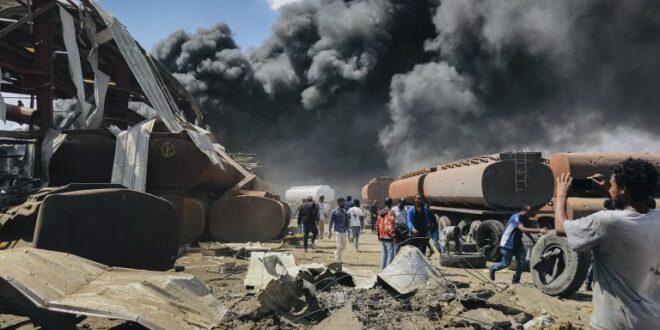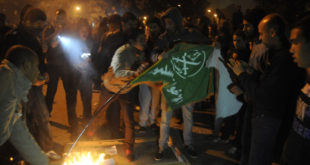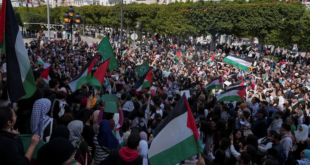As Ethiopia’s civil war continues to drag on, Tigrayan rebels are advancing toward the capital, leading the government in Addis Ababa to declare a state of emergency, currently slated for six months.
The Tigrayan People’s Liberation Front (TPLF) has apparently joined forces with another rebel group, the Oromo Liberation Army (OLA), which has reinforced the rebels’ southern advance.
The spreading famine has further contributed to instability throughout Ethiopia along with growing concerns over the potential for spillover violence into other countries in the region.
A recent report co-authored by the United Nations and Ethiopia’s human rights commission concluded that all parties to the conflict “committed violations of international human rights, humanitarian and refugee law, some of which may amount to war crimes and crimes against humanity.”
As Ethiopia’s civil war continues to drag on, Tigrayan rebels are advancing toward the capital, leading the government in Addis Ababa declare a state of emergency, currently slated for six months. The state of emergency provides Ethiopia’s government with the ability to detain critics, shutter media, and establish curfews to limit movement. Reporting suggested that several Ethiopian army units were in retreat, painting a far different picture than the overconfident assessments offered early on by Ethiopia’s Prime Minister, Abiy Ahmed—formerly a winner of the Nobel Peace Prize in 2019 for his efforts to end Ethiopia’s longstanding war with neighboring Eritrea. Yesterday, Ahmed punctuated the one-year mark of the war by promising to “sacrifice our blood and bone to bury this enemy and uphold Ethiopia’s dignity and flag.”
Ahmed has come under intense scrutiny for his handling of the conflict. Last year, Ahmed launched an ill-fated assault of Tigray in order to vanquish his main political rival, the Tigray People’s Liberation Front (TPLF), following the TPLF’s attack on the Ethiopian military’s Northern Command headquarters. In June, the Ethiopian military withdrew from Tigray, with several thousand soldiers captured. Since the summer, the TPLF has maintained its momentum, resulting in the current offensive and advance through towns approaching Addis Ababa as they move from north to south. The TPLF has apparently joined forces with another rebel group, the Oromo Liberation Army (OLA), which has reinforced the TPLF’s southern advance.
Ahmed called on Ethiopia’s citizens to pick up weapons and defend the country against the rebels’ offensive. The government may also look to conscription to reinforce the ranks of the Ethiopian armed forces. The Ethiopian government has restricted journalists from entering parts of the country to cover the conflict, and when combined with frequent internet disruptions, the result has been a dire conflict lacking the international attention it deserves. The conflict has destabilized Africa’s second most populous country and featured widespread human rights abuses. President Biden threatened Ethiopia with sanctions tied to the accusations of grievous human rights abuses and pushed the importance of peace talks to end the conflict. Tigrayan rebels have also been accused of committing atrocities. A recently released report co-authored by the United Nations Human Rights Office and Ethiopia’s human rights commission concluded that all parties to the conflict “committed violations of international human rights, humanitarian and refugee law, some of which may amount to war crimes and crimes against humanity.”
A spreading famine in Ethiopia has further contributed to instability throughout the country and growing concerns over the potential for spillover violence into other countries in the region. As with any civil war, there is a significant risk that refugees and internally displaced persons will bear the brunt of the humanitarian crisis. Ethiopia’s blockade of the Tigray region imperils a population of over 5 million people in need of humanitarian assistance. The United Nations assesses that approximately 400,000 people are currently facing “famine-like conditions,” as reported by the New York Times.
The civil war is not the only major issue to ensnare Ethiopia recently. In an interesting twist, the recent coup in Sudan may have an Ethiopia link. The coup was allegedly backed by Egypt’s President Abdel Fattah al-Sisi; the Wall Street Journal reported that just prior to the coup, Abbas Kamel, Egypt’s intelligence chief, traveled to Sudan to meet with coup leader General Abdel Fattah al-Burhan, but eschewed meeting with Abdalla Hamdok, Sudan’s prime minister. Hamdok has been supportive of Ethiopia’s Grand Ethiopian Renaissance Dam (GERD) project, which Egypt claims will interfere significantly with waters running into the Nile River.
 Eurasia Press & News
Eurasia Press & News




